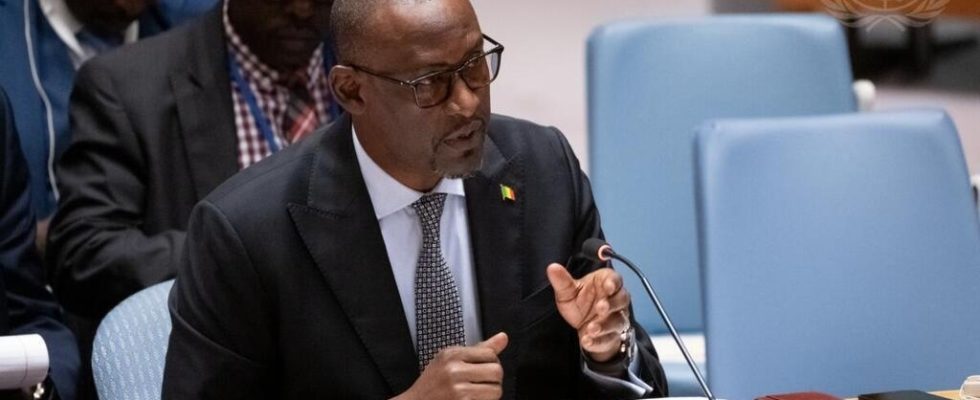Tuesday, September 19, 2023, the debates of the UN General Assembly opened. This 78th session, at the institution’s New York headquarters, will last a week during which heads of state or their representatives will take the podium one after the other. This annual mass begins while Africa, particularly in West Africa, has been experiencing repeated military coups for three years.
5 mins
There is already a question: who will represent Niger, which experienced a new coup d’état on July 26, 2023? A big question indeed given the stakes for the CNSP junta on the diplomatic level.
General Abdourahamane Tiani, president of the junta which still holds elected President Mohamed Bazoum prisoner, still dispatched his Minister of Foreign Affairs, Yaou Sangaré Bakary. He was appointed Niger’s representative to the UN last March, well before the putsch.
Read alsoUN General Assembly: who to represent the new juntas in power in Africa?
Yaou Sangaré Bakary still has his diplomatic passport and his ambassadorial accreditation to access the headquarters of the Organization. But there is no indication that he can speak as Nigerien diplomacy minister. A representative officially recognized by the UN joining unrecognized putschist authorities is enough to embarrass the United Nations, which finally decided to suspend Niger’s intervention at the forum initially planned for this Thursday, September 21.
Especially since in this diplomatic battle, the leaders of the overthrown regime are also trying to make their way to the podium in order to speak in the name of President Bazoum and reaffirm his legitimacy!
Guinean Mamadi Doumbouya present in New York
For Guinea, the head of the CNRD junta is present at this session. It is even the only junta represented by its president. This is the colonel’s first major official international trip. Mamadi Doumbouyaapart from his presence in Turkey last May for the inauguration of President Recep Tayyip Erdogan.
The president of the Guinean transition is due to speak this Thursday, September 21 at the UN, giving him visibility and international legitimacy. But above all, this session should allow Colonel Doumbouya to reassure his partners: “He will deploy all his diplomacy to seek the funds necessary to finance the transitionsupports Amadou Sadjo Barry, professor of philosophy and political analyst. The government says it needs 600 million dollars for the execution of the timeline. The partners are also observing the behavior of the junta in the face of its own promises, and I think that disappointments are starting to arise. Hence the difficulty in putting your hand in your pocket, especially since financial scandals break out here and there. There are concerns related to the political management of the transition, which could in the long term create frustrations and tensions with partners who had given the benefit of the doubt to Colonel Doumbouya. »
Speech by the Malian Minister of Foreign Affairs
The speech by the representatives of Mali is also eagerly awaited. He is now the essential Minister of Foreign Affairs, Abdoulaye Diopwho is scheduled to speak on the last day of the General Assembly.
Several human rights NGOs have documented numerous abuses committed, according to them, by the Malian Armed Forces and their Russian proxies under Wagner. They hope that the Malian authorities will give guarantees for the protection of civilians, while the UN Peacekeeping Mission in Mali (MINUSMA) is packing up.
“Since the military came to power, there have been attempts to prevent the UN or other organizations from documenting human rights violations, or to renew the mandate of MINUSMA but without prerogatives regarding these rightssays Samira Daoud, West and Central Africa director at Amnesty International. With the departure of MINUSMA, we are very concerned, because the Mission had privileged access to certain areas and victims directly affected by the armed groups on the one hand, but also by the FAMa and their Russian allies on the other hand, notably in Moura. »
Last year for Mali, it was Colonel Abdoulaye Maïga, then interim Prime Minister, who carried out the exercise with a particularly bellicose speech against African leaders and especially against France.
A problem: the exercise of the power of Transitions
For the case of Mali or that of Burkina Faso, which has experienced two coups in just eight months, political scientist Amadou Sadjo Barry believes that the central problem remains that of the very exercise of power: “When we analyze the way in which the transitional authorities conceive the relationship with political power and security governance, we realize that we are in a form of continuity and reappropriation of the practices which have undermined these countries. We must confront these juntas with their contradictions, because these ways of doing things have nothing to do with geopolitical considerations. It is not at the UN that the transition problems in the Sahel will be resolved. Is it up to Colonel Assimi Goïta and his friends to decide what to do? Or is it up to Malians to agree to design a multicultural society on the political and institutional levels? And it is not through a warmed-up sovereignist discourse that we are going to answer these fundamental questions for our societies. »
On Burkina Faso, currently commanded by the young captain Ibrahim Traoré, Amnesty also hopes that the representative of the Sahelian country will provide guarantees on the restoration of fundamental freedoms, deeply abused since the coup d’état of September 30, 2022.
Read alsoUN: General Assembly opens in context of serious multiple crises
